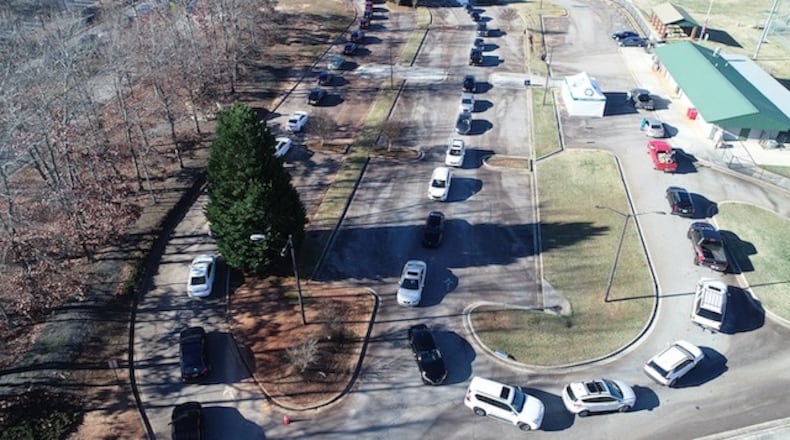The latest wave of COVID-19 is again scrambling some plans for metro Atlanta workers to be back in company offices.
With cases of the omicron variant surging, some big employers that earlier reopened workplaces are now discouraging staff from coming in or giving them new flexibility to opt out.
Other companies, including Home Depot, are hoping to stick with plans for a return to corporate campuses this month. But employers say they are cautiously monitoring whether they will need to make a quick pivot as the pandemic enters its third calendar year of disruption.
“We’re currently planning to return to the office in mid-January, but we’re watching the situation closely,” Home Depot spokeswoman Margaret Smith wrote in an email Tuesday.
Delivery giant UPS is now discouraging employees from being in reopened company offices. So is Cox Enterprises, which owns The Atlanta Journal-Constitution.
UPS said because of the high transmissibility of the omicron variant, all its office employees who can work remotely are being encouraged to do so. The company’s headquarters in Sandy Springs reopened in early September, but even before the latest COVID-19 surge, many workers continued to use flexible work options and often weren’t on the corporate campus.
Banking giant Truist is giving its employees more flexibility to choose to work remotely despite office returns that are slated for most non-branch employees this month.
CNN said that for now it is continuing to keep its office closed for most workers. It had shut facilities in December, citing soaring COVID-19 cases around the nation. In a memo to employees last month, a company executive wrote, “We are doing this out of an abundance of caution.”
For many companies, it is unclear how long the latest changes will remain in force. Uncertainty has been a constant in many workplace amid a pandemic that keeps morphing.
Still, many employers are hungry for more on-site business collaboration and to offer more stability for employees’ work lives. Through much of the pandemic, many Americans not in frontline jobs were given flexibility to regularly work from home, a perk that was far less common before COVID-19 struck.
In the latter half of July, the number of elevator trips logged in metro Atlanta offices was only half what it was before the pandemic, according to TK Elevator. When cases of the delta variant rose, some employers pushed back plans to reopen offices after Labor Day. Gradually, more employees came back.
Still, by early December, employee access swipes into buildings had risen to a weekly average of only about 40% of what they had been, according to a 10-city analysis by security technology firm Kastle Systems. Atlanta wasn’t included in the average.
By mid-December, with concerns about omicron still growing, some executives across a variety of industries told consulting company Gartner they were delaying workplace reopenings or reducing the number of staffers in company spaces. Yet, more of those queried hadn’t made a decision about changing scheduled reopenings or were seeing no impact.
Even now, Peyton Day, chief executive of Atlanta-based co-working provider Roam, said it’s too early to know how many employers will delay return-to-office plans. Many are still trying to figure it out, he said, adding that business has held up through omicron so there’s not a great urgency to make people come back.
But some are making tweaks to policies. With the omicron surge, Delta Air Lines recently required people to wear masks indoors at all the company’s facilities.
A Coca-Cola spokesman declined to comment Tuesday on whether the company expects an impact on its workplace plans. Spokespeople at Fortune 500 packaging giant WestRock, insurer Aflac and utility parent Southern Company indicated their companies are continuing to monitor the situation but so far have not shifted plans.
WestRock said as it did before the holidays it is allowing office staffers to work from corporate spaces or remotely. Aflac said about 1,000 employees are back working at its Georgia facilities, which is less than 25% of what it would have typically. For on-site workers it conducts random COVID-19 testing as well as testing upon request.
Southern’s Georgia Power reopened its offices to all employees, in varying circumstances, in December. Southern said its employees must provide vaccine verification or be tested weekly for COVID-19 by government deadlines.
UPS is requiring employees in certain U.S. offices to be vaccinated when they return to those workplaces, including the corporate headquarters. The same rules are not in place for workers at its delivery facilities or out in the field.
— Staff writer Kelly Yamanouchi contributed to this article
Keep Reading
The Latest
Featured



